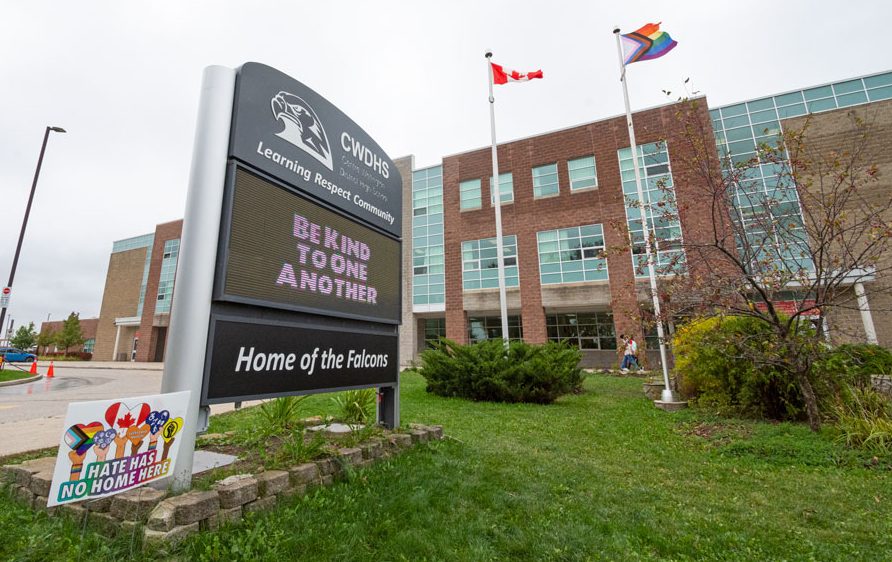CENTRE WELLINGTON – Anyone hoping to learn more about the assault of a student at Centre Wellington District High School by another student on Oct. 7, or about punishment for the 14-year-old boy charged with assault, might have been disappointed with the community meeting hosted by the Upper Grand District School Board on Oct. 28.
The incident was not addressed, the punishment was not discussed, and there was no opportunity for the public to air grievances.
Brent McDonald, executive superintendent of education for the board, told the 130 participants on the webinar the board is governed by the Safe Schools Act and cannot confirm any more details than those already known – that a student was assaulted on Oct. 7 and required medical treatment, another student was charged, “and we will not discuss details or the situation,” he said.
Instead, “we must work together to ensure the school is inclusive, safe, and that students are supported,” he said.
“That is the purpose of this meeting.”
The school’s principal Jennifer Meeker acknowledged it’s been a rough start to the school year.
“Negative student behaviour is on the rise,” including transphobia and homophobia, she said.
“Many parents have shared their concerns about school safety.”
But “violence is unacceptable,” she said, adding the school has instituted measures as a result of the assault, including:
- a school assembly to bring the issue in the open;
- highlighting the board’s online tool for students to report bullying;
- more teacher supervision inside and outside the school;
- additional child and youth workers have been deployed to the school; and
- teacher training on how to identify and deal with aggressive behaviour.
On the webinar were Wellington OPP inspector Paul Richardson, Family and Children’s Services of Guelph and Wellington County executive director Sheila Markle, Compass Community Services executive director Joanne Young Evans, Wellington Catholic District School Board superintendent Tyrone Dowling, as well as representatives from other community organizations, but they did not speak.
Helen Fishburn, CEO of the Canadian Mental Health Association Waterloo Wellington, also sits on the Violent Threat Risk Assessment Committee, which includes all those organizations.
Fishburn said incidents of violence at school are really issues for the whole community and that over the pandemic, “dark feelings and disturbing behaviour have surfaced in our community.”
Peter Sovran, the new director of education for Upper Grand, said this meeting is the first step in getting to solutions.
“We will need to disrupt some of our thinking and challenge some of our assumptions,” he said.
But the main speaker was Kevin Cameron, executive director of the North American Centre for Threat Assessment and Trauma Response, who has worked with school boards and police services across the country in developing violence risk assessment programs.
Cameron is also a family therapist, marriage therapist and is involved with ongoing research around human behaviour and family dynamics as it relates to trauma.
Cameron said he is familiar with the Centre Wellington community as he was called to advise after several youth suicides in recent years rocked the community.
“This community has had lots of loss,” he said.
“But intense loss and trauma doesn’t create a new dynamic in human systems. Instead, it intensifies already-existing trauma.”
The effects of the pandemic cannot be discounted either, he said. As adults became more anxious, or depressed or angry, so did our children.
“Kids, at the core of it, will only be as mature and healthy as the adults (around them),” he said.
Cameron talked about the social dynamic that happens in families – he called it the closeness-distance cycle. It’s that need to spend time with your family – that makes us feel loved and safe and secure and attached, he said.
“But there’s also a need for away time,” he said. “The cycle got impaired with COVID.”
For kids who can’t leave the house, that “away time” might be spent online playing video games with friends.
“A lot of students have had more time to mine more deeply into the internet and so many kids have gotten in over their heads.” Cameron said.
“Kids can find things; people can prey on them.”
It’s also known that domestic violence has increased during the pandemic and just as violence causes trauma, “trauma can beget violence,” he said.
Just as people can land anywhere on this trauma-violence continuum, so do they fall in the trauma response continuum, he said.
At one end, the people who insist they are okay after a tragedy; at the other end an acute response; and in the middle are folks who move in and out of periods of feeling anxious and feeling okay.
For some, high anxiety can rekindle old traumas. For others there’s a “slow burn,” Cameron called it – those who do okay for a period of time and then suddenly have a meltdown.
“Everybody deserves a good meltdown every now and then,” he said.
Cameron also spoke about the need to have meaningful conversations with our children and let them know the adults in the room can handle whatever they hear.
He reminded participants that threats and acts of violence can also be calls for help. And that young minds are malleable and there are negative forces – at home, online and in person – that can influence their behaviour.
But parents and caregivers have the most influence, he said, and the community needs to create a process “to come together as adults.”
He concluded, “If we build on leadership, there are miracles to be worked.”
Krista Sibbilin, director of services with the CMHA, said this meeting was the first in a series the organizations are planning.
Questions raised by participants will be compiled and responses distributed to all who attended.
Participants will also be asked to fill out a survey for feedback and to determine next steps.



